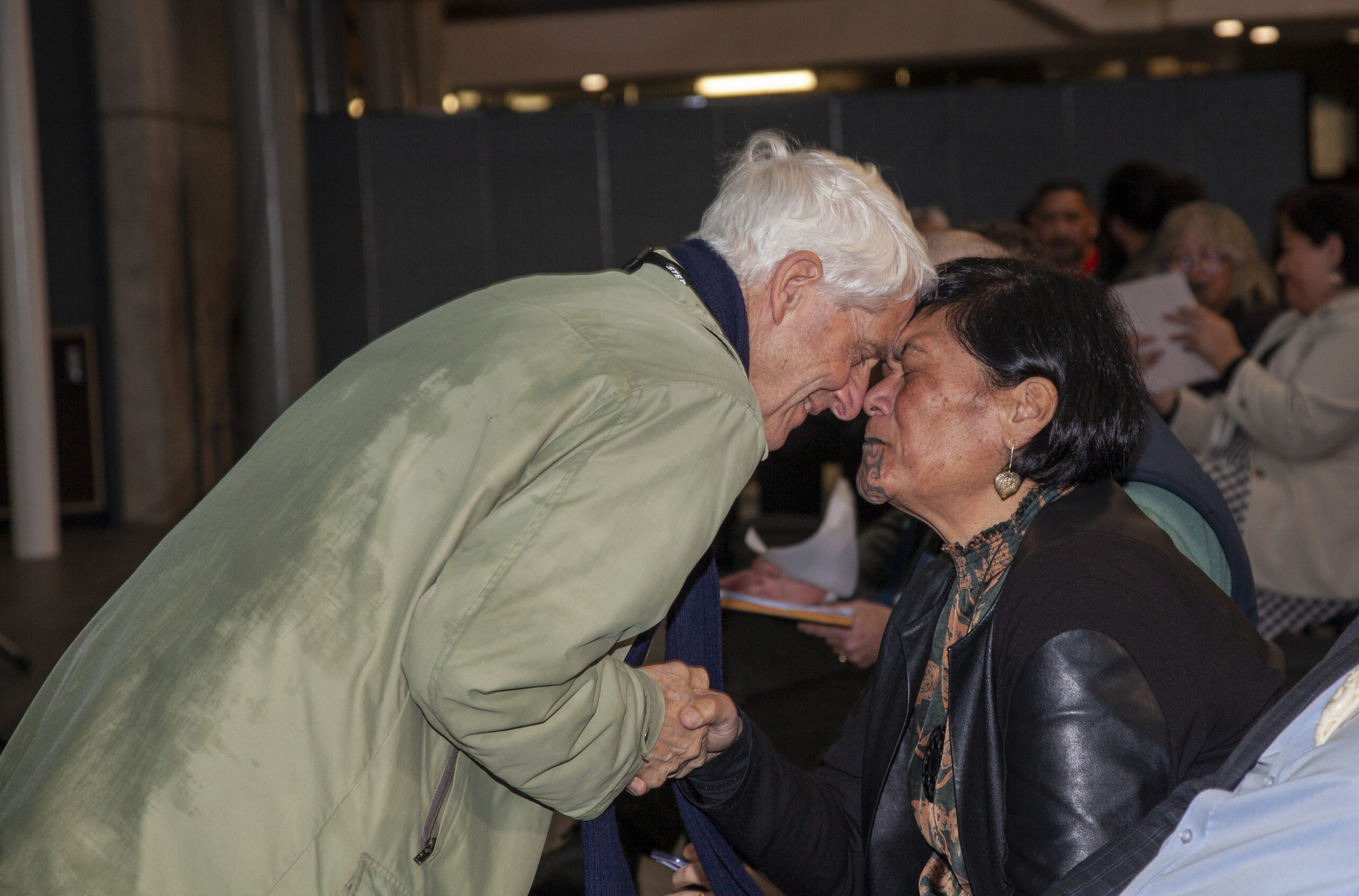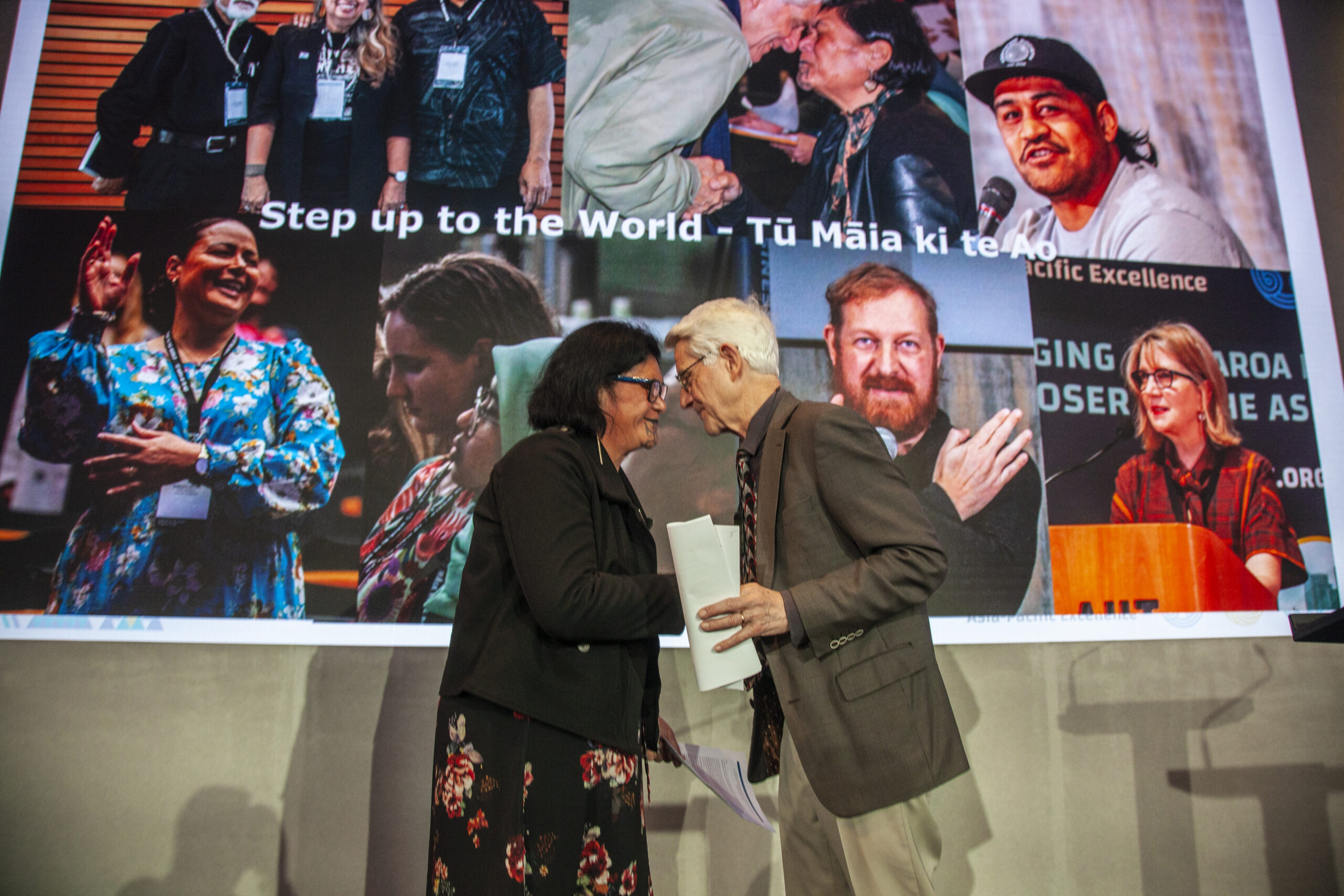Part I of this blog identified the conceptual insights which members and affiliates of the Centre, and invited guests, have offered on the modern plight of the human condition, and of potential ways forward. As Director of the Centre for eight years (and stepping down on 31 December), it has been a privilege to be exposed to such deep and rational thought.
My varied professional career – academic, UN official, NZ diplomat and MP – gives me pause in presuming to offer insight into the future of the global community. But here are a few thoughts.
Career focus on the ‘existential threats’
My twin focus over five decades has been on two of the three existential threats – nuclear weapons and climate change – plus the associated challenge of taming the primordial instinct to resort to armed force.
Nuclear weapons
- In the 1970s and ‘80s, I worked primarily on nuclear disarmament, being engaged in the Pacific regional and NZ national nuclear-free zones; and arguing the official NZ repudiation of deterrence theory at the UN in Geneva (Committee on Disarmament) and New York (UN Special Session on Disarmament). In the early 2020s, I have returned to the subject, through membership of the Public Advisory Committee on Disarmament whose statutory duty is to advise the PM and Foreign Minister on implementation
- Three decades on, the threat of nuclear conflict is as real as it was in the ‘70s and ‘80s. National sovereignty plus zero-sum mind-set in a fluid strategic environment has neutralised the effort at nuclear disarmament. The NPT (1968) has been a partial success on nuclear non-proliferation, but the failure of the major powers to negotiate nuclear disarmament in good faith has led to the introduction of the Treaty on the Prohibition of Nuclear Weapons. On entry-into-force in 2021, the TPNW has rendered nuclear weapons illegal in international law. The opposition of the nuclear-armed states and nuclear-reliant states has split the international community. But if sovereign equality is to be objectively meaningful, the overwhelming majority support the TPNW, and with the passage of time the minority are in danger of becoming ‘persistent’ objectors to what will become an emerging peremptory norm in customary international law.
Armed force
- In 1993 we worked in PGA on parliamentarian action towards the ICC, led by Hon ANR Robinson (Trinidad & Tobago) and Hon Emma Bonino (Italy). The Rome Statute, in force since 2002, establishes in international law individual criminal liability for genocide, war crimes, crimes against humanity, and acts of state aggression.
- In 2009 I introduced a member’s Bill in the NZ Parliament, which would make it an individual crime in domestic law (10 years imprisonment) for any NZ government leader to commit aggression in violation of the UN Charter. The Bill had a 1st reading and came reasonably close to being handed on to select committee for deliberation (vote: 58 for; 64 against).
- In 2010 the Parties to the Rome Statute finally agreed to make aggression a justiciable crime at the Kampala Amendment Conference (which I attended). New Zealand supported and signed the amendment.
- A decade on, New Zealand has yet to ratify the Kampala Amendment and bring it into domestic law. No single advance in international law will be as effective in curbing the questionable us of armed force as individual liability on the part of political leaders. Some 16 NATO states including Germany have ratified, confining NATO’s collective self-defence article decision-making to what is strictly lawful under the UN Charter. It concentrates the mind – on the law. Non-ratification of the Kampala Amendment to the Rome Statute is the single biggest failure of New Zealand foreign policy.
Climate change
- In 1990, we organised in PGA the first international parliamentarian workshop on climate change, involving MPs from 15 large countries (including Brazil, Indonesia, China, USA, UK, South Africa). Assisted by IPCC experts with AR1 about to be released, we issued the Bellagio Communique, calling for a 50% cut in global GHG (all-gas) emissions by 2010 – from 34.2 to 17.1 Gt. CO2-e. In the event, global GHG emissions rose over that time-period by 22% to 41.8 Gt.
- In 1992, I attended the Rio Earth Summit, which adopted the foundational UN Framework Convention on Climate Change. Despite assertions by one developed major power that its lifestyle was not up for negotiation, the Convention recognised, accurately and wisely, the distinction between developed and developing countries. And despite the universal consensus in the Paris Agreement, that distinction still holds.
- In 2009, I participated in the Copenhagen COP15, witnessing its failure deriving from argumentation over the Kyoto Protocol, historical responsibility and per capita differentiation, amidst strategic stand-off between the USA and the BRICs, exacerbated by inept chairing.
- In 2015, I participated in the Paris COP21, which achieved universal consensus on a global strategy for ‘well below 2ͦC’ and ‘efforts towards 1.5’, at the cost of a weaker regime of subjectively-determined national ‘contributions’ to a global goal.
- In 2021, I followed from a distance the outcome of COP26. In the 30 years 1990 to 2020, global (all-gas) GHG emissions have increased xx%, from 27 to 55 GT. (CO2-e). We are still – virtually every country without exception – justifying our shortfall in our national mitigation ‘contributions’ on the grounds of differentiated responsibilities and respective capabilities in light of different national circumstances’ – taking diplomatic ambiguity to absurd and irrational lengths.
Health pandemics
My fleeting engagement with global health issues was participating in the WHO’s 41st annual Assembly in 1998, which, noting the reduction of polio cases to 35,000, called for total eradication by 2000. In 2020, there were 140 recorded cases by WHO. But the emergence of global virus pandemics is changing our socio-political perceptions of governance, at both national and global levels.
Global pandemics have been a feature of human existence since primordial time. But the contemporary question is whether the global health governance system is equal to the challenge of the modern coronavirus type phenomenon. The Centre has not been engaged in this, and would look to the Helen Clark Foundation for insight.
Reflections
None of the above issues reveals humankind – as a global community or a species – as sufficiently competent to tackle and resolve global threats. In 2021, the UN and many of its Member States declared a climate emergency. The only way to tackle an emergency is to assume legitimate emergency powers. The only UN body empowered to that end is the Security Council.
- In 2007, the issue was brought onto the Council’s agenda but the idea of any proposed action on climate change was opposed by several permanent members, and nothing was agreed.
- The issue was brought forward again in 2011, with the UNSG advising the Council that in his view climate change was a threat to international peace and security, the criterion for potential enforcement action. Instead, the Council issued a presidential statement describing climate change as a ‘risk multiplier’ – acknowledging what had been obvious for the two decades since the 1st IPCC Assessment Report of 1990.
- In 2020, a formal draft declaring climate change to be a threat to IPS was drafted but not put to the vote because of the opposition of several permanent members.
- In 2021 it was re-tabled and put to the vote for the first time, being vetoed by one permanent member with another abstaining.
Opposition to enforcement action by the Security Council on climate change rests on a stated view that traditional multilateral negotiation remains the appropriate method of handling the issue. But the traditional method has weakened by the move from a ‘top-down’ approach in Kyoto (2007) to a ‘bottom-up’ approach (Durban-Paris-Glasgow). Pretending that 1993 entities claiming sovereignty, with 193 (or even five) effective vetoes, can solve a shared global problem and pursue effective remedial action defies rationality. Pretending that 193 subjectively-determined national contributions will achieve a drastic global target defies rationality.
While it is correct that the 1.5° global goal will fail without coordinated and ambitious action from non-governmental entities (private sector, civil society, personal lifestyle), that is simply one precondition, and certainly not sufficient in itself. Avoidance of dangerous climate change will not be achieved without legitimate enforcement action by the UN, whether this is the Security Council or some future body. The private sector and civil society will respond to legitimate political –diplomatic leadership.
Nuclear disarmament, the lawful use of force, climate stabilisation – and indeed a non-pandemic global society – will not be achieved on the basis of national sovereignty allowed free rein. The UN Charter, enshrined 75 years ago in the international age, sought a balance between ‘sovereign equality’ and the ‘common ends’ (universal peace). It is dangerously ironic that the balance has reverted to national sovereignty in the two decades of the global age.
To a large extent these increasingly inter-connected problems derive from the human population explosion – from 2 to 8 billion in one lifetime. I recall, from my participation in the 1994 UN Population Conference, that the (then) 185 member states representing the (then) 5.7 billion humans, judged it inappropriate to initiate far-reaching action to curb the population growth. As a result, the global ecological footprint is 56% above Earth’s carrying capacity. No way to run a planet.
The planetary interest
In 1989, working for Parliamentarians for Global Action, I developed the concept of the ‘planetary interest’ in PGA’s quarterly newsletter. The concept subsequently took the form of an edited book ‘The Planetary Interest: A new concept for the global age’ (UCL/Routledge/Rutgers; 1999), with chapters submitted by MPs from 20 major countries and foreword by UNSG Kofi Annan. We defined the planetary interest as:
”the interests of the planet, comprising
(1) the survival and viability of humanity, contingent on maintenance of the physical integrity of Earth and the protection of its ecological systems and biosphere from major anthropogenic change; and
(2) the universal improvement in the human condition in terms of basic human needs and fundamental human rights”.
Each country’s ‘legitimate national interest’ should be compatible with the planetary interest. ‘Legitimate global power’, as recognised by the global community properly assembled, would respond to the nature and severity of the global threat. The principle of subsidiarity, developed with insight and cogency by the EU, would apply to differentiate and legitimise power at the global-regional-national-sub-national levels.
Something similar was recently captured by Stewart Patrick (Sr. Fellow in Global Governance, Council on Foreign Relations) in his article: The International Order Isn’t Ready for the Climate Crisis: The case for a new planetary politics (Foreign Affairs Nov./Dec. 2021). A discourse on the conceptual congruence has been struck with the author.
The normative and the imperative
Action on existential threats is determined by the nation-state, with the UN acting as background researcher and negotiating arena. National action reflects more the domestic political scene than the international diplomatic compromise over voluntary ‘contributions’. Domestic politics continues to be interpreted simplistically through the unidimensional horizontal left-right axis. That framework is three centuries old, and is focused on normative political judgement over how we humans live within our national societies – essentially comprising two fundamental values, freedom and equality, in a competitive setting. The environmental crisis gets squeezed into this inappropriate thought-prism, and comes out unrecognisable.
In 2009 as an MP, I advanced the idea that contemporary politics required an updated framework that took proper account of the existential crisis we face, particularly climate change. I proposed a two-dimensional axis, supplementing the horizontal normative axis (left-right) with a vertical axis (up-down) for the ‘imperative’ issues of survival against existential threats. Such a framework allows people – political representatives and voters – to move more freely left or right, according to personal view, while simultaneously judging the ‘existential politics’ on the basis of an imperative. Thus, sustainability becomes the third political value, and is not disfigured on the horizontal axis.
Proactive or reactive?
Qualitative steps forward in political history have been essentially reactive. Humanity has yet to demonstrate an ability to act proactively in transforming institutions and legal obligation to deal with a major common threat before it occurs.
The next few decades will determine whether we have that capability.







0 Comments